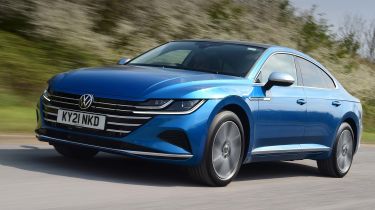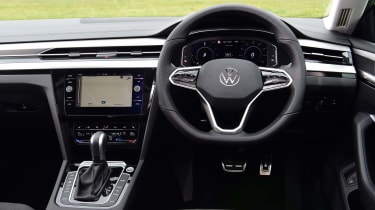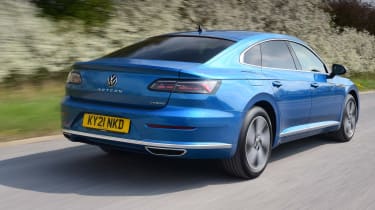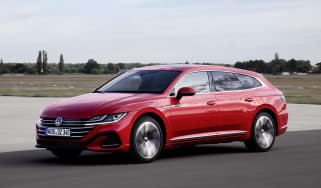Volkswagen Arteon eHybrid review
Plug-in hybrid power adds a new level of refinement and comfort to Volkswagen’s stylish family car, although it's still not as fun to drive as its looks suggest

Pros
- Refined
- Stylish
- Over 30 miles electric range
Cons
- Transmission
- Not as fun as rivals
- Noisy engine when battery runs out
| Car type | Electric range | Fuel economy | CO2 emissions |
|---|---|---|---|
| Plug-in hybrid | 35-39 miles | 202-257mpg | 26-32g/km |
The Volkswagen Arteon is the more stylish sibling to the conventional Passat. Available as both a fastback and shooting-brake estate, Volkswagen’s rakish family hauler is now offered with plug-in hybrid – here badged 'eHybrid' as opposed to the plug-in Passat's 'GTE' moniker.
It’s not just in the looks department that the Arteon is a step above the practical Passat. Underneath the swooping bodywork is a 1.4-litre petrol engine complemented by some electrical assistance. Not only does it produce a total power output of 215bhp and 400Nm of torque, it also adds a new level of refinement to the Arteon’s already appealing package.
With CO2 emissions as low as 26g/km, the eHybrid falls into the 11% Benefit-in-Kind (BiK) company-car tax band. As a result, you may only need to pay £890 a year to run one, compared to £1,985 per annum for the entry-level diesel Arteon.
The electric motor on its own produces 113bhp, and Volkswagen claims you can drive on electric power for up to 39 miles before the engine kicks in – although we only hit about 30 miles when we tested it. Regardless, if you select EV mode, you’ll be able to drive in town and travel at motorway speeds without having to use the combustion engine, as long as there's charge remaining in the battery.
The transmission is possibly the weakest part of the eHybrid’s drivetrain, as the six-speed dual-clutch gearbox isn’t as sophisticated as some of the ones you find in newer plug-in hybrids. But the experience does improve when the two motors are working together.
However, while the eHybrid can accelerate from 0-62mph in 7.8 seconds with the aid of the electric motor and is wonderfully civilised around town, once the battery is depleted and the petrol engine is left to shoulder the load by itself, it becomes noticeably noisier.
Recharging the 13kWh battery takes three-and-a-half hours using a 3.6kW home wallbox charger, rising to five hours with a standard three-pin domestic supply. You can of course recharge the battery while driving, using the engine. However, the purpose of a plug-in hybrid is to reduce consumption, which doesn’t sit well with using the Arteon’s engine as a generator. If you do, fuel efficiency plummets well below the near-257mpg the eHybrid is capable of if you use its electric range as much as possible.
The extra weight of the eHybrid powertrain does mean it’s less agile in corners than its purely petrol or diesel-engined counterparts. It still handles well, mind you, but only slightly better than a Passat, and doesn’t offer as involving a driving experience as you might expect based on its looks.
Yet, on the motorway, that maturity you feel on more winding roads, and the hybrid powertrain’s benefits, pay dividends and make this an ideal long-distance cruiser. Similarly, the eHybrid comes as standard with adaptive dampers; they're best left in 'Comfort' mode for a superb balance of smoothness and control.
Rear headroom is slightly compromised by the rakish roofline, but that’s a small price to pay for the car's handsome styling. Plus, you still get a sizable 563-litre boot that’s accessed through a large powered tailgate, offering a much bigger boot opening than the four-door saloon Passat.
The eHybrid powertrain is available in both Elegance and R-Line trim levels. The former starts at £41,330 and comes with three-zone climate control, keyless operation, semi-autonomous adaptive cruise control, a 10.25-inch digital dashboard and an eight-inch infotainment system with navigation.
There's also plenty of safety and assistance features, including adaptive LED lights, lane-keeping assistance with road-edge recognition, blind-spot monitoring, autonomous braking, all-round parking sensors and a rear camera. The R-Line builds on that with sportier-looking front and rear bumpers, as well more alloy-wheel design options, ambient lighting and a panoramic sunroof as standard. The Arteon R-Line eHybrid starts from £42,170.
Overall, the Arteon eHybrid offers a comfortable ride, excellent refinement and strong efficiency as long as you remember to charge it – as is the case with all plug-in hybrids. Although it's not as sporty as its styling suggests, it features a combination of well tested Volkswagen parts that combined create a predictably well rounded model and very appealing company-car option.



